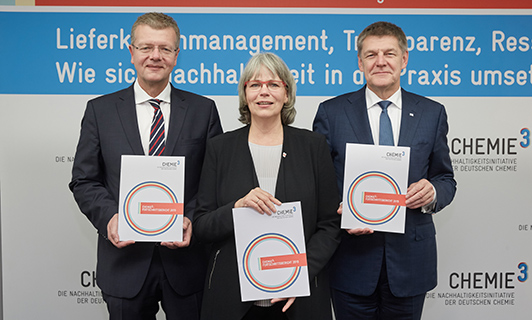CHEMIE³ LEGT ERSTEN FORTSCHRITTSBERICHT VOR
Pressemitteilung, 4. November 2015
Die gemeinsame Nachhaltigkeitsinitiative des Verbandes der Chemischen Industrie (VCI), der
Industriegewerkschaft Bergbau, Chemie, Energie (IG BCE) und des Bundesarbeitgeberverbands Chemie (BAVC) hat heute in Berlin ihren ersten Fortschrittsbericht vorgelegt. Darin beschreiben die Allianzpartner ihre gemeinsamen Aktivitäten und erste Resultate seit dem Start der Initiative im Mai 2013. Kern der bisherigen Arbeit von Chemie³ waren die Verankerung der zwölf Leitlinien zur Nachhaltigkeit fur die chemische Industrie in Deutschland sowie die Etablierung eines Dialogs mit wichtigen Stakeholdern.

© Nürnberger | VCI
v.l.n.r.: Klaus-Peter Stiller (BAVC), Petra Reinbold-Knape (IG BCE), Utz Tillmann (VCI)
„Höchste Priorität geben wir dem Ziel, die Initiative in die Breite der Branche zu tragen“, betont VCI-Präsident Marijn Dekkers in dem Bericht. Das speziell für kleine und mittelständische Unternehmen erarbeitete Unterstutzungsangebot zur Umsetzung der Leitlinien bringt Chemie³ diesem Ziel näher. Zu den wichtigsten Fortschritten zählt die im Sommer 2014 eingerichtete und seither kontinuierlich ausgebaute Online-Plattform für Mitglieder www.chemiehoch3.de. Die Mitglieder können sich dort beispielsweise über die konkrete Bedeutung der Leitlinien, Good-Practice-Beispiele, Leitfäden und Förderprogramme des Bundes informieren. Auch in Fachveranstaltungen zu ausgewählten Themen erhielten die Mitglieder Hilfestellung zur Umsetzung von Nachhaltigkeit in der Unternehmenspraxis. Der Fortschrittsbericht stellt zudem einzelne Werkzeuge für Mitgliedsunternehmen, wie den eigens entwickelten Chemie³-Nachhaltigkeits-Check und erste Praxiserfahrungen aus Unternehmen, vor. „In keinem anderen Land und in keinem anderen Industriezweig arbeiten Industrie, Arbeitgeber und Gewerkschaft gemeinsam und so systematisch an dem Ziel, Nachhaltigkeit in einer ganzen Branche zu etablieren“, unterstreicht Michael Vassiliadis, Vorsitzender der IG BCE, das Engagement von Chemie³.
Darüber hinaus dokumentiert der Fortschrittsbericht den kontinuierlichen und kritischen Austausch mit wichtigen Stakeholdern. Bereits vor dem offiziellen Start der Initiative und bei der Ausarbeitung ihrer zwölf Leitlinien hatten die Allianzpartner wichtige Stakeholder und ihre Erwartungen zur Nachhaltigkeit in der chemischen Industrie eingebunden. „Wir nutzen den Dialog mit den Stakeholdern auch, um die Bedeutung von wirtschaftlichem Erfolg für die Zukunft aller herauszustellen. Denn ohne diesen Erfolg kann die Branche keine Lösungen für globale Herausforderungen und damit Antworten auf ökologische und soziale Fragen entwickeln“, so Dekkers. Der Fortschrittsbericht belegt nicht nur die weitere Ausgestaltung dieses konstruktiv-kritischen Dialogs, sondern veröffentlicht auch erstmals Fragen und Forderungen ausgewählter Stakeholder und die gemeinsamen Stellungnahmen der Allianzpartner dazu.
Zu den wichtigsten weiteren Zielen von Chemie³ bis 2017 zählt die Ausarbeitung neuer Fortschrittsindikatoren zur Nachhaltigkeit. Anhand dieser sollen sich ökonomische, ökologische und soziale Erfolge der Branche entlang der zwölf Leitlinien künftig messen lassen. Vor allem bei den sozialen Indikatoren beschreiten die Allianzpartner Neuland: „Dieser Diskussionsprozess ist intensiv und braucht Zeit, aber er lohnt sich“, hebt Margret Suckale, Präsidentin des BAVC, hervor. „Ende 2016 werden sich dann – zum ersten Mal überhaupt – die Sozialpartner einer Branche auf eine gemeinsame Definition verständigen, was soziale Nachhaltigkeit bedeutet und wie sie gemessen werden kann.“
Downloads
Chemie³ presents first progress report

© VCI/Nürnberger
From left to right: Klaus-Peter Stiller (BAVC), Petra Reinbold-Knape (IG BCE), Utz Tillmann (VCI)
The joint sustainability initiative of the German Chemical Industry Association (VCI), the Mining, Chemical and Energy Industrial Union (IG BCE) and the German Federation of Chemical Employers’ Associations (BAVC) presented today in Berlin its first progress report. In this document, the alliance partners describe their joint activities and first results since the launch of the initiative in May 2013. So far, the work of Chemie³ has been focusing on anchoring the 12 sustainability guidelines for the chemical industry in Germany and on engaging in a dialogue with major stakeholders.
VCI President Marijn Dekkers emphasizes in the report: “Taking the initiative across our entire industry is the highest priority for us.” The support offer for the application of the guidelines is tailored for small and medium-sized enterprises and brings Chemie³ closer to this goal. The most important achievements include the online platform for members www.chemiehoch3.de. This platform was set up in summer 2014 and has been expanded continuously since its inception. For example, members can use the platform to find out about the concrete meaning of the guidelines and to obtain information about good practice examples, guidance documents and federal promotion programmes. Special events on selected topics provide further support for members in making sustainability a reality in corporate practice. The progress report also outlines individual tools for member companies (e.g. the specifically developed Chemie³ sustainability check) and first practical experiences from the companies. IG BCE chairman Michael Vassiliadis underlines the commitment of Chemie³: “There is no other country and no other sector where industry, employers and trade union work jointly and systematically towards establishing sustainability in a whole sector.”
Moreover, the progress report documents the continuous and critical exchange between major stakeholders. Already before the official launch of the initiative and when elaborating their 12 guidelines, the alliance partners had involved the major stakeholders and given consideration to their expectations to sustainability in the chemical industry. Dekkers: “We also benefit from the dialogue with stakeholders for highlighting the importance of economic success for everyone’s future. Without such success, we cannot develop solutions to global challenges and, consequently, answers to environmental and social issues.” The progress report addresses not only the future shaping of this constructive-critical dialogue; for the first time, it also publishes questions and demands from selected stakeholders and the relevant joint positions of the alliance partners.
Further important goals of Chemie3 to 2017 include the development of new progress indicators for sustainability. Based on such indicators, the economic, environmental and social successes of the sector along the 12 guidelines are to become measurable in the future. Especially with the social indicators, the alliance partners are entering new ground. BAVC President Margaret Suckale stresses: “This discussion process is intensive and takes time, but it is worth it. It is a first, because in late 2016 the social partners in one sector will agree on a common definition of what social sustainability means and how it can be measured.”